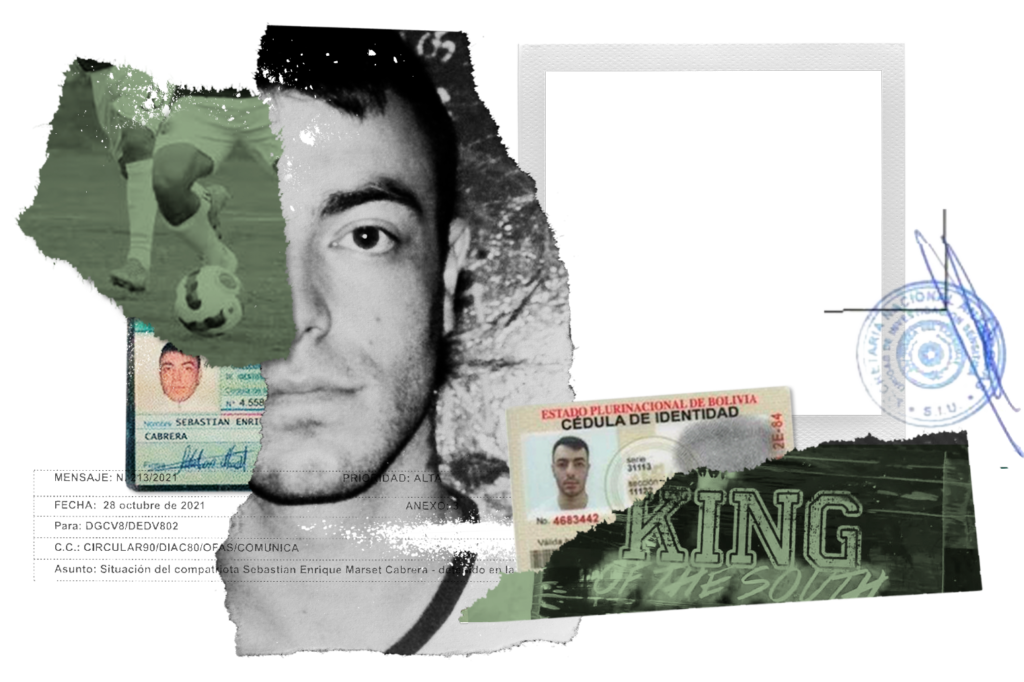July 18, 2024 at 9:00 a.m.
ASUNCIÓN, Paraguay — The midfielder stepped up to take the penalty kick. It was a steamy, bright morning at Erico Galeano Stadium. In the stands, fans wearing yellow and blue stood up, squinting into the sun, focusing on the man with the number 10 on his back. On the sidelines, coaches crossed themselves as he ran toward the ball.
His name was Sebastián Marset. He had appeared at Deportivo Capiatá — a gritty professional soccer team — seemingly out of nowhere. He drove a Lamborghini that he would speed across the gravel parking lot. Square-jawed and handsome, he was adorned with gold jewelry, Rolexes, and intricate tattoos running down his right arm.
Marset was an average player, with the skills of someone whose career had peaked in high school. But when Capiatá’s coach, Jorge Nuñez, kept him on the bench, the players surrounded Nuñez and insisted that Marset needed to play.
“I kept wondering, ‘Who is this guy?’” Nuñez said in an interview.
And now here was Marset taking a crucial penalty kick. The score was 1-1. It was May 29, 2021, halfway through a challenging season. A win could spark a turnaround.
Silence fell over the stadium, quickly followed by groans, coaches and staff recalled in interviews. The ball soared five feet over the goal’s crossbar. Even the team’s security guard couldn’t hide his frustration, kicking the dirt and wondering aloud why Capiatá’s fate had been entrusted to Marset.
Over the next two years, the reasons would become clear. Sebastián Marset, it turned out, was among the most significant drug traffickers in South America and a key figure behind a surge of cocaine arriving in Western Europe, according to Latin American, U.S., and European investigators.
Instead of hiding from authorities, he had used his fortune to buy and sponsor soccer teams across Latin America and Europe. U.S. and South American investigators would learn that he was using those teams to help launder millions in drug proceeds.
Along the way, Marset, now 33, leveraged his power and wealth to fulfill a boyhood dream: he inserted himself into the starting lineups.
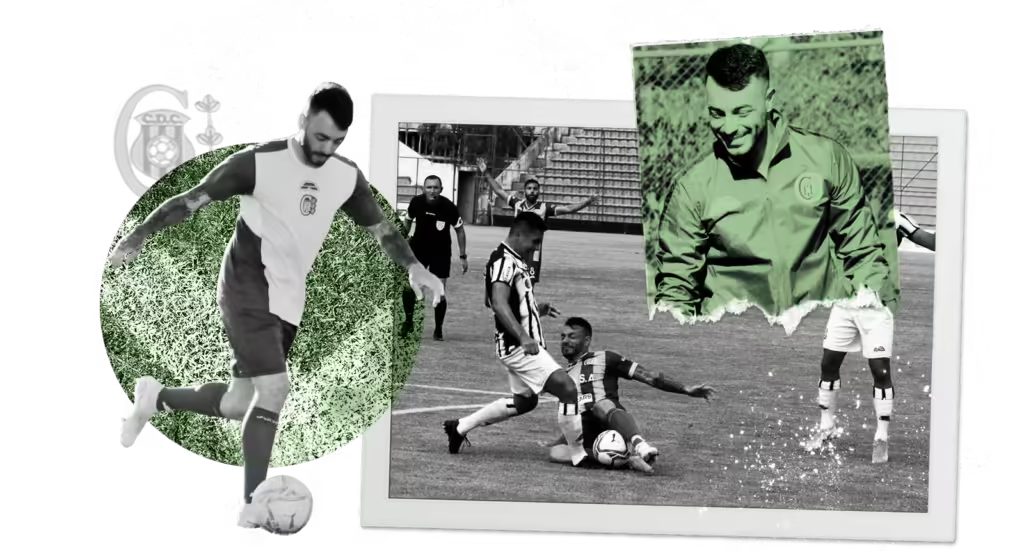
Sebastián Marset played on several professional soccer teams over a period of years. (Paraguay national police, iStock)
Marset’s odyssey reads like a transnational caper, bordering on the absurd, but it offers a startling glimpse into the impunity at the intersection of Latin American public life and lower-tier professional soccer, enabling drug traffickers to wield significant influence in both realms. Years after a global manhunt for him began, Marset remains at large.
His rise was meteoric — by age 28, according to a Paraguayan criminal indictment, Marset was moving cocaine and suitcases of cash across South America in a fleet of private jets. By 31, he had amassed more than $1 billion, authorities estimate. He branded his drug shipments with the moniker “The King of the South.” He issued orders to deputies operating in four countries: where to stash the cash, whom to pay off, how to hide the cocaine under packages of cookies or soybeans. He eliminated his enemies without remorse, soliciting advice on how to dispose of their bodies, according to his text messages aggregated by the Paraguayan attorney general’s office.
Marset took breaks to play professional soccer — first at Capiatá — where he adopted the same assertive tone as when coordinating drug shipments, imagining himself as the midfield conductor, even as he struggled to keep up with his teammates. He paid $10,000 in cash to wear the No. 10 jersey, worn by legends like Pelé, Maradona, and Messi.
When he shoved opposing players to the ground, referees turned a blind eye. Marset flashed a thousand-watt smile.
His rise coincided with a surge in cocaine trafficking from South America to Europe. Marset played a pivotal role in perfecting that route, dispatching tons of drugs from Uruguayan ports to Belgium, the Netherlands, and Germany, investigators say, forging ties with existing cartels worldwide.
Building that empire and laundering its proceeds brought Marset into contact with some of the continent’s most powerful politicians. These connections were explicit: He borrowed a Paraguayan senator’s plane, was caught trafficking drugs with the uncle of a Paraguayan president, and had one of his lawyers secure meetings with top Uruguayan officials to arrange his release from prison. Some of his most valuable connections, though, were in professional soccer.
The link between drug trafficking and soccer is almost as old as the U.S. drug war. Money spent on the sport is untraceable in much of Latin America. Player contracts, transfer fees, ticket proceeds, merchandise sales — almost all of it can be fudged, according to money laundering experts, transforming cocaine money used to fund a team into clean soccer profits.
“The legitimization of illicit funds was done through sports,” the Paraguayan prosecutor’s office wrote in a 500-page internal investigation into Marset obtained by The Post.
But it was more than that. Soccer in Latin America is the bedrock of power and politics. For a drug kingpin, running a soccer team, even in a lower league, translates criminal power into public power.
In the 1980s, Colombian drug kingpin Pablo Escobar bankrolled his hometown soccer club, Atlético Nacional, turning it into one of Latin America’s best teams. When detained in 1991, he flew in famous players to play on the prison soccer field. In the early 2000s, Tirso Martínez, an associate of Mexican drug trafficker Joaquín “El Chapo” Guzmán, used his drug earnings to purchase several Mexican soccer teams. Martínez’s nickname was revealed after his arrest and extradition to the United States in 2015: “El Futbolista.”
But Marset is the first major drug trafficker to use his status and wealth not only to bankroll professional soccer teams but to play on them. Some of his games were held just miles from where he had deposited the bodies of his cartel rivals, based on descriptions in his text messages. Depending on whom you believe, his athletic career was either a sophisticated strategy to conceal his identity or an attempt to fulfill an unrealized dream.
Asked which it was, Marset’s lawyer, Santiago Moratorio, laughed in his office in Montevideo, Uruguay’s capital. “He always wanted to be a soccer player,” he said.
As U.S. and South American authorities chased Marset across the continent, to the Middle East, and Europe, he was always one step ahead, vanishing only to reappear on another professional soccer field, often using a new false identity. He managed to bribe his way out of a Dubai prison as U.S. officials — who came to see Marset as a threat to public institutions across Latin America — watched in frustration. He left a trail of high-profile murders in his wake, authorities allege, including Paraguay’s anti-corruption prosecutor, gunned down on his honeymoon at a Colombian beach resort.
As he ran from authorities, Marset left voice notes and video messages, often mocking the officials who trailed him. “I’m too smart for you,” he said in one video message last August, the camera tightly framed around his face, wearing a gold chain and a neat beard. “If you want, keep hunting me, but I’m telling you that I’m far away.”
Authorities knew they were unlikely to catch Marset in the middle of a cocaine bust. So they adapted their investigation to its target: they began scouring professional soccer stadiums.
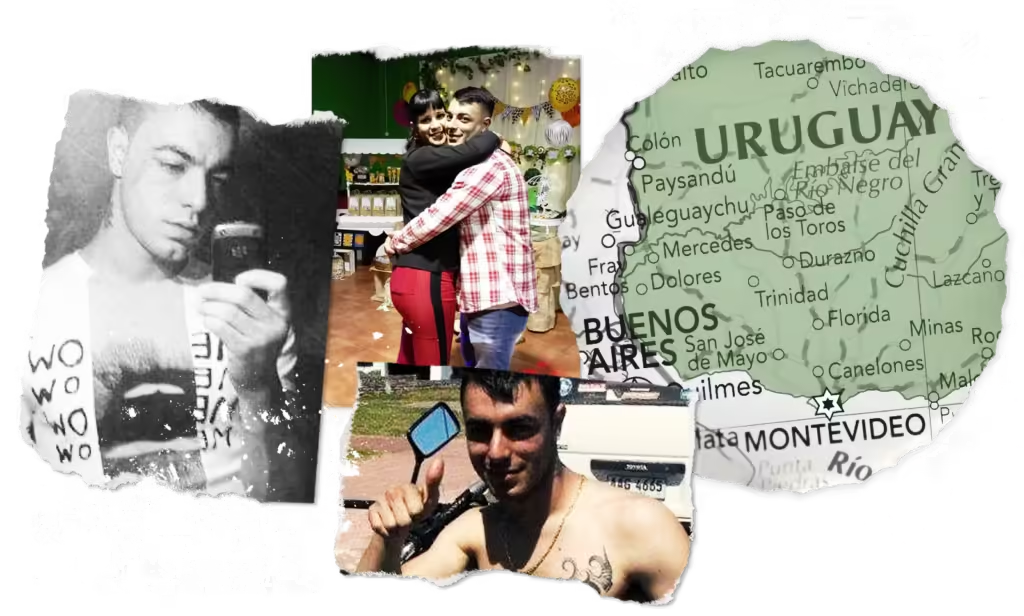
(Uruguayan senate investigation, Paraguay national police; iStock)
In school, Marset was a top student—a skinny, whip-smart kid who liked to stand in front of the room and lecture his classmates as if he were the teacher. As he grew older, his focus shifted to a single goal: becoming a professional soccer player. He and his friends played in the street, constructing makeshift goals out of stones and using markers to sketch numbers on the back of their T-shirts because they couldn’t afford uniforms.
Marset’s dream of soccer stardom was driven, at least in part, by the desire for money. He worked at a gas station and spent his salary on a David Beckham Adidas track jacket. He frequented nightclubs attended by girls from wealthier neighborhoods. Friends sometimes saw him walking home alone because he couldn’t afford bus fare from downtown Montevideo.
After high school, Marset started playing semi-professional soccer in Montevideo’s intermediate division. It quickly became clear that he wouldn’t go further. He wasn’t fast enough, his touch was mediocre, and his passes were wayward.
Marset’s initial interactions with Montevideo’s criminal underworld were minor. In 2009, at 18, he was arrested for possession of stolen goods, and a year later, at 19, for possession of narcotics, according to Uruguayan court records. But he soon showed he was willing to take on more risk. At 22, Marset accepted a job receiving a shipment of marijuana scheduled to arrive in rural Uruguay on a small plane from Paraguay, according to Uruguayan police.
Normally an assignment for a team of men, the traffickers trusted him to handle it alone.
He waited on a farm not far from Uruguay’s northern border with Brazil, standing next to his black Chevrolet Cruz. Unbeknownst to him, the police had been tipped off. They arrived in the clearing where Marset was waiting, and he immediately surrendered to the two officers from the Brigada Antidrogas, the country’s elite anti-narcotics police.
Marset explained that he was a professional soccer player. He was shrewd and respectful, one of the agents recalled. Soon the officers learned that the shipment wasn’t an amateur operation; the pilot was the uncle of Paraguay’s then-president, Horacio Cartes.
The agents handcuffed Marset and took an improvised mug shot in their field office. One of the agents looked at the other when Marset was out of earshot. “This guy is going to be a big problem for us someday,” he recalled saying.
Marset was sentenced to five years in prison for drug trafficking. He was sent to Libertad, one of the country’s largest prisons, and placed in a section devoted to drug trafficking and organized crime.
There, he expanded his criminal contacts, investigators said. He got a job as a prison cleaner, allowing him to visit almost every cell in the block, chatting with inmates as he mopped. He met prominent international drug traffickers, including members of the Italian mafia and Brazilians from the increasingly influential First Capital Command gang. The men played fierce soccer matches in the prison yard in the afternoons.
“He was lost for soccer,” said one prison guard.
Drug trafficking in South America was on the verge of a major shift. For years, the cocaine produced in Colombia, Bolivia, and Peru was bound almost exclusively for the United States. By the late 2000s, American pressure on drug smuggling to the United States forced traffickers to search for new markets and new routes.
Large drug shipments had rarely moved south, into Paraguay and Uruguay. But Montevideo, Marset’s hometown, had a port that dispatched massive quantities of commercial goods to Europe daily. For the traffickers, it was a nearly untapped source of revenue. And Marset realized he was sitting right on top of it.
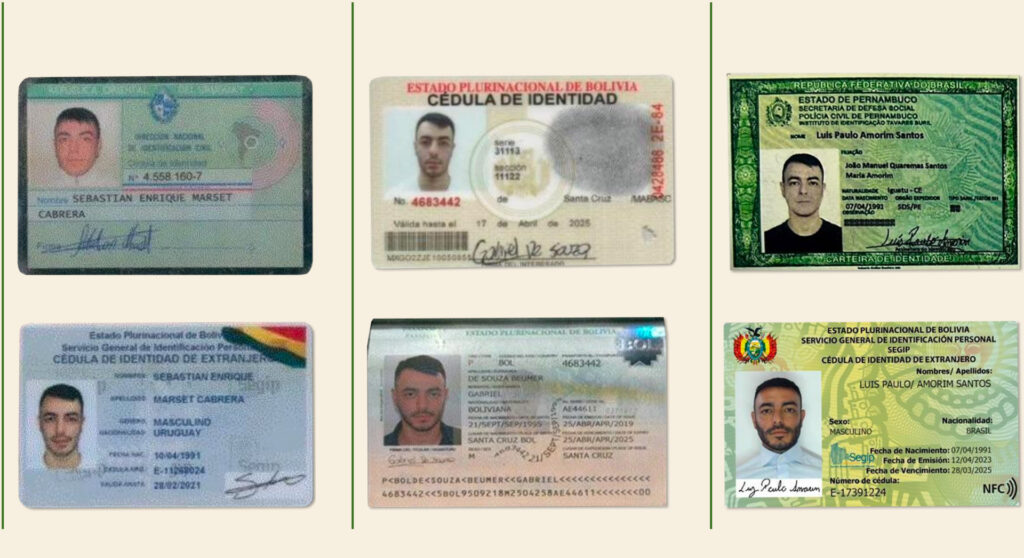
(Bolivia national police; Paraguay Office of the Attorney General)
While most fugitive drug traffickers are cautious about discussing their operations, Marset and his associates openly boast about his rise. Even his lawyer, Moratorio, was keen to highlight his client’s skills.
“Everyone leaves prison with contacts,” Moratorio said. “But it was also his own ability and what he did once he got out that propelled him to where he is now.”
By 2020, Paraguayan and U.S. authorities had noticed a surge in cocaine arriving in Paraguay from Bolivia, destined for Europe via Uruguay’s ports. Some shipments bore a new stamp: PCU, standing for Primer Cartel Uruguayo.
It was an obvious target for U.S. and Paraguayan investigators: Who was behind this new cocaine boom?
Paraguayan officials secured wiretaps on phones linked to the criminal network and recruited spies among the drug traffickers. The U.S. Drug Enforcement Administration dispatched planes to photograph the clandestine airfields that were appearing across Paraguay.
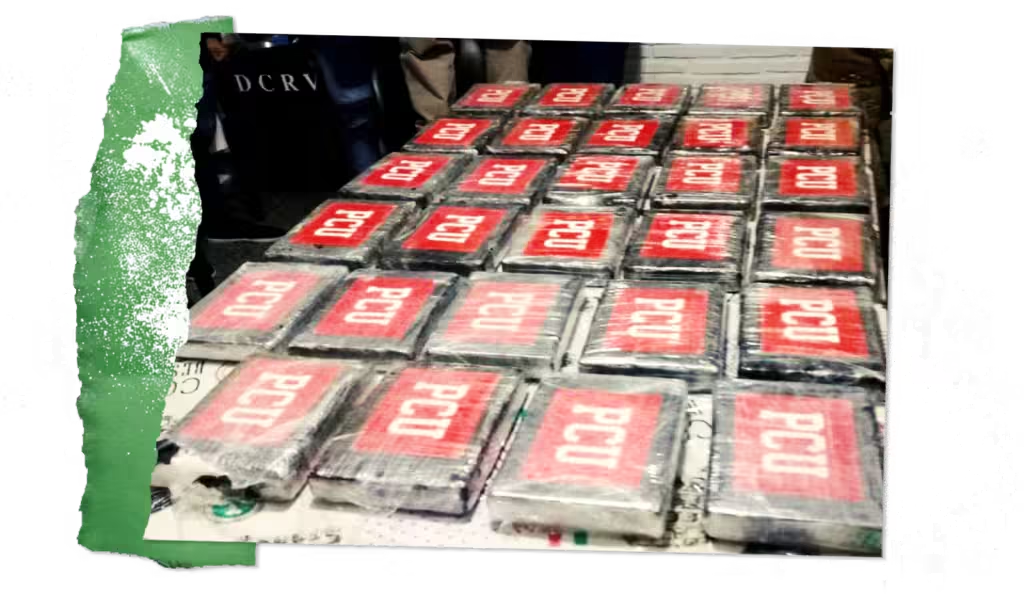
(Uruguayan Ministry of the Interior; iStock)
Within months, officials from both countries began hearing about a key figure at the center of the organization.
“A young Uruguayan man with his right arm tattooed” was the initial description of the target, according to a U.S. official.
“He was young but clearly powerful,” remarked a former senior Paraguayan official.
On wiretapped phone lines, his associates and employees referred to him as “El Jefe Mayor” or “The Big Boss.” To avoid detection, he sometimes disguised himself as a priest while traveling. He used code names from the soccer world for his drug shipments: “Maradona,” after the legendary Argentine player, and “Manchester,” after the English city known for its Premier League teams.
When threatened, he responded with violence. He described his killings in flippant text messages, often accompanied by gory photos, which investigators later obtained.
“I shot him twice,” he wrote in one text. “It seems to me he dropped dead.”
“Do we have a place to disappear a body?” he asked a few weeks later. “Is it best to put it in acid?”
Regarding another victim, he wrote: “That one was dumped in a field. It will be on the news in the next few days.”
Officials documented how this man and his organization moved vast quantities of cocaine. They dispatched small airplanes from Paraguay’s main commercial airport, with pilots turning off their radar mid-flight. They flew covertly across the border to Bolivia, landing on remote farms in Chapare, the country’s coca-growing region, where traffickers loaded the planes with one to two tons of cocaine.
The planes then returned to Paraguay, landing at clandestine airstrips scattered throughout the northern part of the country. The cocaine was transported by trucks to container ships waiting on the Paraguay River, which flows through Paraguay to the Atlantic Ocean. Traffickers knew these ships were rarely inspected before arriving in Europe; the port of Montevideo had only one semi-functional scanner. Each planeload of cocaine was worth more than $20 million once offloaded in Belgium or the Netherlands.
Officials identified at least 13 private jets being used by the cartel, with four of them dedicated exclusively to moving cash.
However, they struggled to identify the man running the operation, the tattooed young Uruguayan. They didn’t realize that when his voice disappeared from the wiretaps for periods, it wasn’t always because he was off trafficking cocaine.
Often, it was because he was in the middle of a professional soccer game.
One rainy morning in early 2021, employees at Erico Galeano Stadium heard an engine revving in the gravel parking lot. When they approached, they saw a silver Lamborghini speeding in tight circles, skidding across the surface.
The team’s security guard approached the car. The driver rolled down his window.
“I asked him, ‘Aren’t you worried about damaging your car?’” said the guard, who spoke on the condition of anonymity for security reasons. “And he just looked at me and said, ‘Don’t worry. I have four more.’”
It was Marset. He extended his right hand, with a lion tattooed across the knuckles, and introduced himself as Deportivo Capiatá’s newest player.
Marset began attending daily practice sessions and posing for team photos, always in the center of the frame. He was like a kid sneaking onto the field to play with his heroes—exuberant but inept. He brought his wife and three young sons to watch him play; he wanted them to see a win.
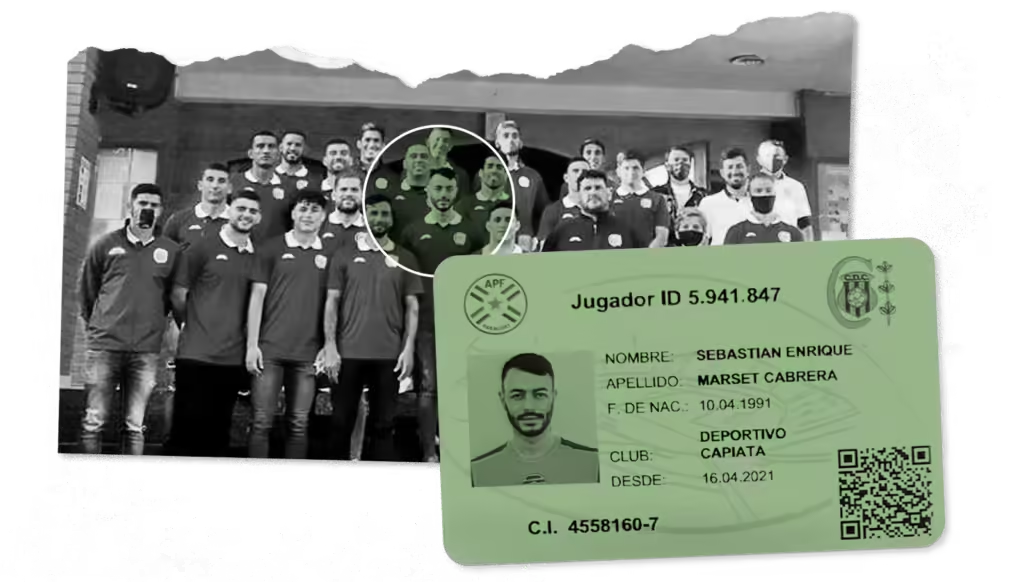
(Paraguay national police; Bolivian court documents; iStock)
He struck a deal with his teammates, promising to pay each of them several thousand dollars on top of their existing contracts for every victory. For many players, it was a life-changing sum. For Marset, living in a penthouse at the luxurious Palacio de los Patos condominium with a sauna and a 75-foot pool, it was inconsequential.
However, Capiatá continued to struggle, partly due to Marset’s poor performance. He botched passes, failed to support his defenders, and missed easy goal-scoring opportunities. As the team kept losing, one young player broke down in tears, lamenting another missed chance to earn the bonus Marset had promised.
By this time, Marset was juggling his soccer career with an active social life among Paraguay’s elite in the capital, Asunción. On April 11, 2021, he sent out birthday invitations across the city in the form of fake boarding passes that read: “Birthday of Commander Sebastián Marset.”
It was his 30th birthday, and the party had an airplane theme. A private jet was parked outside the venue, and attendees posed for photos behind a cutout of a plane labeled “Emirates Marset.” The cake was a five-tiered masterpiece topped with an edible airplane.
The next day, he was back at practice. Players began to wonder, as investigators would later: Of all the teams in Paraguay, why had Marset chosen theirs?
Deportivo Capiatá was the pride of an Asunción suburb, famously defeating Boca Juniors, Latin America’s most celebrated club, in Argentina in 2014—a significant underdog victory. (Capiatá eventually lost the second leg of the contest in a penalty shootout.)
For a time, Capiatá’s success was attributed to its powerful backer, Erico Galeano, after whom the team’s stadium was named.
Galeano was a Paraguayan senator and tobacco baron with close ties to the country’s most influential politician, former president Cartes, who was placed on the U.S. sanctions list for “rampant corruption.” Cartes effectively continued to control parts of the country.
Both men had used soccer for political and financial gain and worked in Paraguay’s National Congress to keep sports teams exempt from money-laundering legislation. Cartes funneled tens of millions of dollars to one of the country’s biggest soccer clubs, Libertad, while Galeano invested millions in Deportivo Capiatá, according to government records. Paraguay’s attorney general later argued that roughly $1.3 million of Galeano’s investment in the team came from cocaine trafficking.
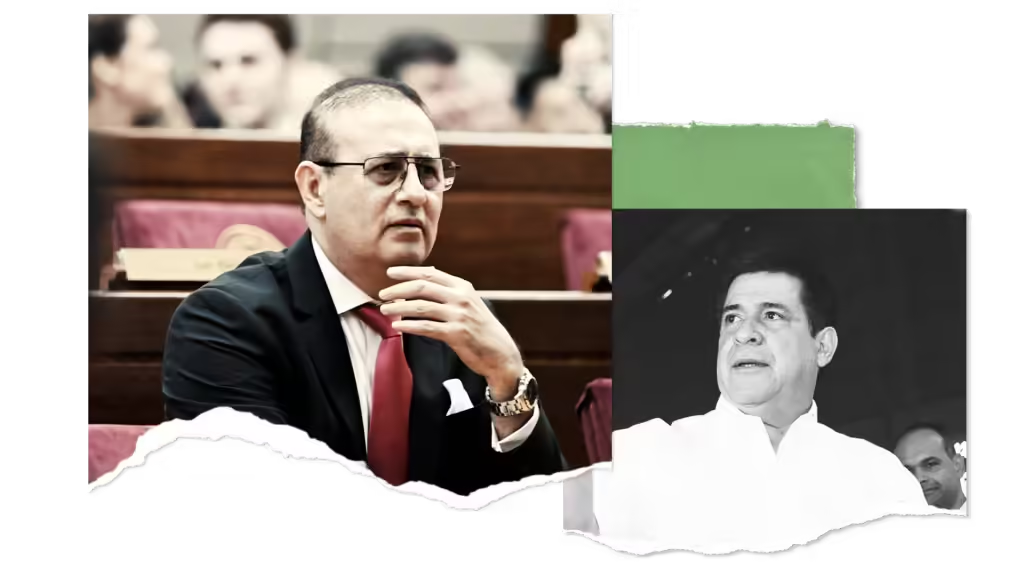
Erico Galeano, a Paraguayan senator, left. Horacio Cartes, Paraguay’s former president, right. (Obtained by The Washington Post; Daniel Duarte/AFP/Getty Images; iStock)
By 2016, Galeano was elected president of Capiatá. He sat just above the sideline in the stadium, and the team’s popularity bolstered his own.
However, the team’s performance began to decline, leading to its relegation to the second division in 2019. Fan attendance dropped, and players complained about inadequate equipment and gear.
When Marset arrived in 2021, he started funding improvements: new physical therapy beds, televisions, and better food in the cafeteria. This won over his teammates. Though not formally listed as the team’s owner, Marset funneled drug money into Capiatá, investigators say, and siphoned off a portion of its revenue.
Marset also bought himself a spot on the squad. However, the team’s coach, Nuñez, a former Paraguayan World Cup player, was unimpressed.
“I had the obligation to win, or else they would fire me,” said Nuñez, who initially planned to keep Marset on the bench. “But it wasn’t the same for him. He was just having fun.”
Investigators believed only one person could have brought Marset to Capiatá: Galeano. Paraguayan prosecutors discovered that Marset had been using Galeano’s company’s private jet to transport his associates. They also identified property deals between Galeano and Marset’s cartel, leading to Galeano’s indictment.
“Erico Galeano Segovia was at the service of the transnational criminal organization dedicated to international cocaine trafficking,” the attorney general’s office stated this year. The case has yet to go to trial.
Initially, Marset seemed unconcerned that his soccer career at Capiatá might attract authorities’ attention. He allowed the team to publish his name on its roster before games each week.
However, by the end of May 2021, Marset learned that narcotics officers were looking for him. Investigators believe he was tipped off by high-level contacts in the Paraguayan government.
He stopped attending practice at Capiatá, and his name was abruptly removed from the team’s roster.
When players saw his empty locker, they asked if anyone had heard from him. No one had.
It would not be his last time playing professional soccer while on the run. Capiatá was only the beginning, proof of what he could get away with.
As the manhunt for Marset intensified, he doubled down on his double life as a professional player. He attempted to expand his soccer empire to Europe, appearing in the starting lineups of new teams in new countries.
It seemed like a reckless approach to evading arrest, destined to backfire.
Except it didn’t.
ASUNCIÓN, Paraguay — The undercover agents slipped into a squat brick house in a residential neighborhood.
This building, secretly rented by the U.S. Drug Enforcement Administration, had become the nerve center of one of Latin America’s most significant drug-trafficking investigations. The situation was dire.
The small team of American and Paraguayan agents had been tasked with identifying the head of a new transnational drug cartel that was sending boatloads of cocaine to Europe. To avoid leaks, they operated in isolation from the rest of the police force. Despite months of work, they had scant information about their target, other than knowing he was dangerous and well-connected.
Then, one day in 2021, they received a critical tip: The cartel’s leader was about to board a private jet at Silvio Pettirossi International Airport, just outside Asunción, the capital.
As the agents watched the passengers, one man stood out. His tattoos matched the descriptions they had heard on wiretaps. When he presented his identification, it was a Bolivian passport, which the agents immediately suspected was fake. They checked his biometric data, revealing the identity of a Uruguayan national: Sebastián Marset.
“When we heard the name ‘Marset,’ we wondered: ‘Who is this guy?’” recalled a senior Paraguayan official. “The first thing we did was Google him, and the first hit was this soccer player.”
Their target had recently played as a midfielder for Deportivo Capiatá, a team based not far from their rented office. Marset had used his wealth and influence to fulfill a boyhood dream of playing professional soccer, despite lacking the necessary skills.
Word spread among high-level Paraguayan officials, some avid soccer fans, who were stunned to realize they might have unknowingly watched their target play.
“I couldn’t believe that at the center of this massive criminal organization, the leader was a failed soccer player,” said Cecilia Pérez Rivas, the justice minister.
The investigators didn’t want to arrest Marset at the airport; they aimed to build a case that could dismantle his cartel. Over the following months, Paraguayan agents started tracking him.
They followed him as he drove an armored Toyota Land Cruiser to Asunción’s La Galería shopping mall to meet alleged Brazilian drug trafficker Marlon Santos Silva Beiño. They trailed him in a white BMW to a pastry shop to meet Alberto Koube Ayala, a Paraguayan businessman responsible for laundering Marset’s drug money. Neither Beiño nor Ayala could be reached for comment.
They documented how Marset established shell companies throughout Latin America’s private sector, using local media to legitimize these businesses. He was touted as a successful music producer, luxury car dealer, and martial arts studio benefactor. Investigators often felt they were chasing a phantom who seemed to be everywhere at once, struggling to distinguish his real businesses from the fake ones. They wondered about his soccer career since his disappearance from Capiatá.
“He’s obviously very smart,” said one Paraguayan investigator. “And he’s also a sociopath.”
One rainy morning in early 2021, two undercover agents followed a silver Lamborghini through the outskirts of Asunción. Driving an unmarked truck from a previous operation, they kept a careful distance from their target.
Over a two-way radio, they relayed their location back to headquarters. They reported seeing Marset detour through the pothole-ridden streets of a nondescript neighborhood.
Then, the agents watched as he pulled up in front of a soccer stadium and turned off the engine.
One of the agents, clearly taken aback, reported over the radio: “He found another team.”
Marset’s latest venture was a second-division team called Rubio Ñu. Its stadium was about 20 miles from Capiatá.
Rubio Ñu played in a middle-class neighborhood in Asunción, filled with dedicated but long-suffering fans. Some had painted their homes in the team’s green and white colors, continuing a family tradition. The stadium showed signs of neglect, with patchy grass on the field.
Rumors swirled among fans about the man in the Lamborghini. He arrived with a small entourage of men, some with Uruguayan accents. Almost immediately, he began investing in the team.
“We were like, ‘What is going on here?’” said a neighbor, who lives across from the stadium and spoke on the condition of anonymity for security reasons. “A lot of people were scared. It was like a group of mafiosos had descended on us.”
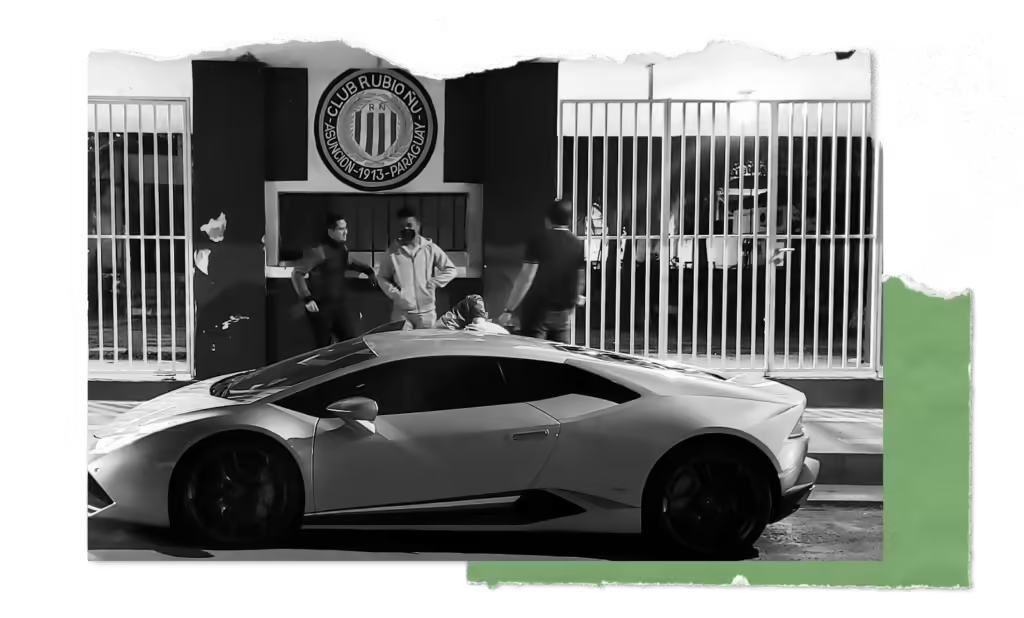
A surveillance photo of Marset’s Lamborghini taken outside the Rubio Ñu soccer stadium in Asunción, Paraguay. (Paraguay Office of the Attorney General; iStock)
Within weeks of Marset’s arrival, he hired a construction team to build a new locker room. Although he practiced with the team, he didn’t play in the games.
After practice, he would dispense the same generic motivational phrases he used in texts to his drug trafficking associates:
“Always be one step ahead my bro,” he wrote.
Marset appointed his brother, Diego Marset, as the intermediary between his drug-trafficking organization and the team, according to investigators. Diego went on a recruiting spree, adding 11 veteran players. He could not be reached for comment.
The agents realized that as Sebastián Marset moved between soccer teams, he was also experimenting with ways to use the sport to launder money. He was expanding, they wrote in a 500-page Paraguayan report, “the universe of soccer within his money laundering scheme.”
At Rubio Ñu, Marset’s focus was on buying and selling players—an age-old method of laundering money through sports. Officials at Rubio Ñu declined to comment.
Investigators later discovered what Marset had in mind: He had identified a team in Europe with its own connections to transnational crime and planned to sell his Paraguayan players there. Transferring Latin American players to mediocre European teams for inflated fees—often fronted by the seller or via fake transactions—has become an increasingly common way to launder drug money, officials say.
“They buy a Colombian player from a very low-level soccer team and then take him to play in the Croatian Soccer League. But they sell him for 100 times or 200 times more than what he cost,” said a Colombian police official, referring to a case in which Albanian drug traffickers laundered money through soccer transfers.
By August 2021, the American and Paraguayan investigators were closing in on their target. They had named their investigation “A Ultranza,” meaning “At All Costs.” It was already the largest anti-narcotics investigation in Paraguay’s history. They had gathered enough documentation to produce at least 50 indictments targeting Marset and his associates, investigators said.
Then, in September 2021, Marset vanished again.
The Americans received new intelligence: He was no longer hiding in Paraguay. He had evaded surveillance. This time, he had left the continent.
When the Uruguayan diplomat stepped through the high walls of Al Wathba prison, surrounded by the Emirati desert, he explained to the guards that he had come for a consular visit with a new detainee from his country.
The guards asked for the prisoner’s name.
“Marset,” the diplomat said, before walking into the holding cell.
Marset was sleeping on the floor of the prison with a blanket, in solitary confinement, according to an Uruguayan diplomatic cable.
One of the world’s most elusive drug traffickers had finally been caught. But it wasn’t for trafficking drugs. Marset had been detained at the Dubai airport for using a fake Paraguayan passport.
“He had finally slipped up,” said a Paraguayan official.
U.S. officials made a case to their Emirati counterparts: If they didn’t strictly enforce his detention until an arrest warrant could be issued by Paraguay, Marset would bribe or finagle his way out of custody.
They were right. From his prison cell, Marset began a campaign to obtain a new passport and secure his release, an effort later documented by Uruguayan and Paraguayan authorities. For reasons that remain unclear, Paraguay was unable or unwilling to issue an arrest warrant after learning of Marset’s detention.
The Uruguayan government, recognizing Marset as a threat, also failed to prevent his release.
“A narco,” Uruguay’s chief consul, Pauline Davies, wrote of Marset in a WhatsApp message to the country’s ambassador to the United Arab Emirates, Álvaro Ceriani, on Sept. 21. The message was part of a trove of documents collected by Uruguayan investigators and provided to The Washington Post.
“A very dangerous and heavy drug trafficker,” Guillermo Maciel, Uruguay’s deputy interior minister, wrote to Carolina Ache, the country’s deputy foreign minister, on Nov. 3.
Marset hired high-profile lawyers who arranged meetings with senior Uruguayan officials, documents show. The team was well-connected: Marset’s top legal adviser, Alejandro Balbi, was the president of Nacional, one of the country’s most famous soccer clubs. Balbi declined to comment.
Marset applied for a new Uruguayan passport to be delivered to him in Dubai.
By November, despite the warnings about the danger he posed, the new passport was being processed. Neither Uruguay’s Foreign Ministry nor its Interior Ministry, which grants passports, intervened, according to Uruguayan investigators.
While he waited to be released, using a phone he had obtained, Marset sought revenge.
He allegedly ordered gunmen to kill Mauricio Schwartzman, the man responsible for securing the Paraguayan passport that had landed Marset in prison, investigators said. Two men using a 5.56-caliber rifle and a 9mm pistol confronted Schwartzman in front of his luxury home in Asunción and shot him dead.
Paraguayan investigators later heard over their wiretaps that the gunmen had been ordered to carry out the hit by the “big boss” of a cocaine-trafficking organization, apparently alluding to Marset.
“According to the big boss, it was [Schwartzman’s] fault that the passport had problems,” the associate said.
A high-profile Paraguayan prosecutor, Marcelo Pecci, was assigned to investigate the case. Pecci later told journalists he believed Schwartzman could have been executed by one of the people targeted in the joint U.S.-Paraguayan investigation into Marset’s cartel.
Less than a year later, in May 2022, Pecci would be killed on his honeymoon at a private beach resort in Colombia. Just hours earlier, his wife had announced that she was pregnant. Colombia’s president, Gustavo Petro, said Marset was responsible for the killing. (Marset subsequently denied any role in the killing when questioned by an Uruguayan journalist.)
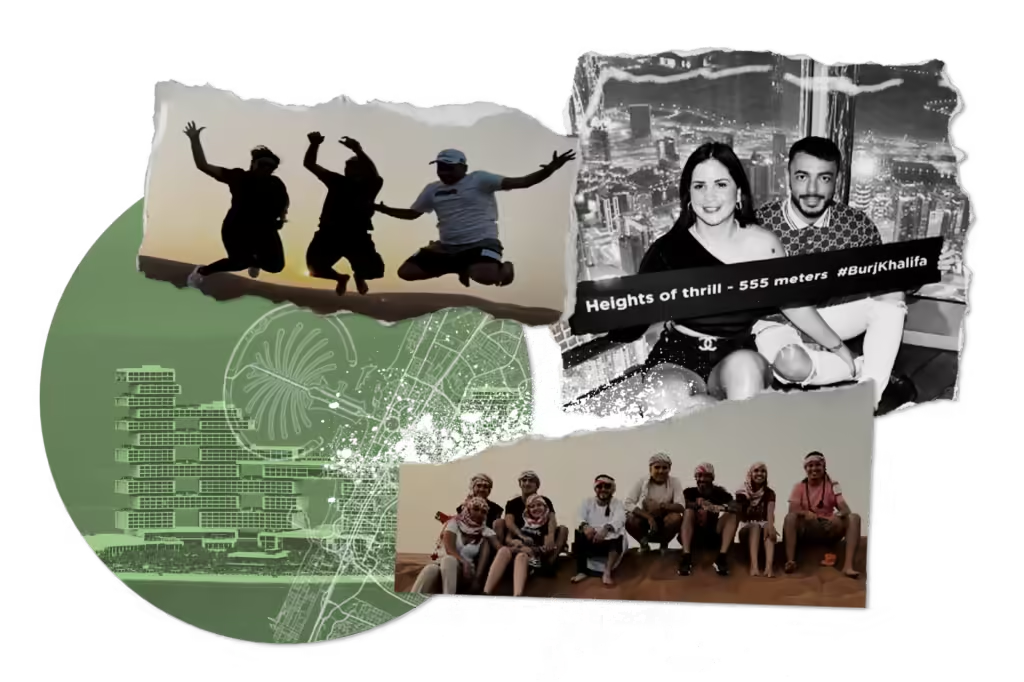
(Bolivia national police; iStock)
But long before that killing, with Marset detained, investigators faced another pressing question: What was Marset doing in Dubai in the first place?
They later found photos of him dressed as a sheikh with a hawk on his arm, atop the Burj Khalifa with his wife, and on a desert excursion with alleged Bolivian drug trafficker Erland Ivar García López. According to property records obtained by research group C4ADS and shared by news organizations E24 and the Organized Crime and Corruption Reporting Project, Marset owned more than $18 million worth of real estate in Dubai.
When investigators obtained Marset’s flight records, they learned that Dubai wasn’t his final destination. He had been planning a trip to Greece.
“We started to ask: ‘What business did he have in Greece?’” said a Paraguayan investigator.
Trikala F.C., based in central Greece, 200 miles northwest of Athens, is a longtime fixture in the Greek Super League 2. Its low-slung stadium, where only a handful of fans sit during home games, is a short walk from an Early Bronze Age acropolis.
The team’s fan base had diminished not only as Trikala continued to lose but as its links to organized crime and match-fixing were exposed. Earlier this year, its former owner, Christos Gialia, was shot more than a dozen times with a Kalashnikov rifle and burned in his car in a mafia-style killing. He had previously been arrested on charges of arms and drug trafficking. The team’s president, Sakis Karatzounis, was convicted of drug trafficking in 2017 after being found in possession of 20 kilos of cocaine and served four years in prison.
Trikala F.C. sometimes recruited foreign coaches, who were shocked by what they found. In 2021, the team hired David Magrone, a former member of the coaching staff at Tottenham Hotspur in England’s Premier League. Magrone left after 10 days, telling soccer journalists that he was scandalized.
“It’s the most amateurish and unprofessional environment I’ve ever stepped into,” Magrone said in an interview with FTBL, an Australian soccer website. “It was like the wild wild West and I don’t say that lightly.”
Magrone said he was aware of the team’s possible involvement in match-fixing. But Trikala’s illicit activities appeared to run deeper.
A few weeks after Magrone’s departure, in September 2021, an SUV arrived at Trikala’s stadium carrying four Paraguayan players and several coaches and trainers. One coach, Manuel Caceres, immediately started paying the team’s Greek employees in cash, according to Trikala players, and began talking about plans to buy the team. Caceres could not be reached for comment.
The players and staff were baffled, even as they relished the sudden wave of new resources.
“Why did they come from Paraguay to invest on the other side of the Atlantic, in Trikala? It was an honor for us, okay, but isn’t it weird?” Zissis Katsandonis, the team manager, said in an interview. “But whatever the team asked them for, we got. Clothes, equipment. Everything was ordered right away. All paid for.”
The Paraguayans would distribute wads of cash in the locker room, said Giorgos Panagiotou, Trikala’s general secretary. “Come, guys, to the changing rooms and take it,” he recalled them saying.
What the Greek players and officials didn’t know was that the Paraguayans had been dispatched by Sebastián Marset, who was en route to Greece when he was detained in Dubai. After his arrest, according to a wiretapped conversation, he had sent his associates instead.
Two of the players and Caceres, the coach, had come from Marset’s last Paraguayan team, Rubio Ñu. They were among the men Marset’s associates had been grooming, promising cash if they played well. Marset, investigators learned, offered each of them $200,000 if they were willing to be transferred to an obscure Greek team. They accepted.
Paraguayan investigators say Marset was hoping to use Trikala to launder cash and create a foothold in Greece to expand his drug-trafficking network. The Greek anti-narcotics police said they were unaware of Marset’s connection to the team, perhaps because of how quickly it dissolved. With his detention in Dubai, Marset’s Trikala scheme fell apart, investigators said.
At the end of 2021, the Paraguayan players and coaches left as abruptly as they had arrived.
“At least it was sudden for me. I didn’t know anything,” said Katsandonis, the manager. “They all left Trikala before Christmas. I don’t know where they went after that.”
Two of the players, apparently broke, returned to Paraguay on a government repatriation flight, accompanied by migrant deportees.
On Jan. 10, 2022, Interpol wrote a message to Uruguay’s Foreign Ministry: “We would appreciate it if you could provide us with an update on its situation and details of where [Marset] is currently.”
Both the U.S. and Paraguayan investigators had assumed their target was still detained in Dubai.
But the Uruguayan Foreign Ministry responded two days later: “The Consulate delivered the passport to the holder and we have not had any information about the citizen since then.”
Marset was a free man.
“With the influence of his wealth and connections, he won,” said a U.S. official.
About a month later, on Feb. 22, Paraguayan authorities carried out Operation A Ultranza, based on their multiyear investigation into Marset’s organization. Twenty-four of his associates were arrested, most of them on drug-trafficking and money-laundering charges. Police raided luxury homes and airplane hangars. They seized nine private jets, 4,000 head of cattle, 13 tractors, and three yachts — in total, more than $100 million in assets.
Erico Galeano, the Paraguayan senator whose soccer team had welcomed Marset, was accused of money laundering. But the government’s support for Galeano was clear: Weeks after his arrest, he was invited to a small soccer game at the president’s residence.
On March 7, Interpol issued an international arrest warrant in Marset’s name. But by then, he was once again a fugitive. News broke in Uruguay about how he had managed to secure a new passport from a prison in Dubai.
The fallout was almost immediate. First, the foreign minister resigned. Then the interior minister and one of his chief advisers. But Uruguay’s president, Luis Lacalle Pou, said the problem was Uruguay’s laws, not corruption within his government.
“Do we like that a drug trafficker has a passport? Of course not,” Lacalle Pou said at a news conference. “But that is the current law.”
The phone buzzed in the newsroom of Channel 4, one of Uruguay’s most popular broadcasters. It was a text message from a South African number.
The sender introduced himself as Sebastián Marset.
It was August 2022, months after his release from the Dubai prison. Marset sent a video message to reporters, who aired it on the nightly broadcast of “Telenoche.” He was fuming about the charges against him and his associates.
“They have no proof of anything of what they say. Nothing,” he said in the video, in which he wore sunglasses and a face mask.
U.S., Paraguayan, and Uruguayan officials were searching for him once again. The drugs flowing from Bolivia to Uruguay and on to Europe had increased. Investigators believed he was still running the operation, from wherever he was.
Then the tip arrived.
Marset was in Bolivia. But he wasn’t just hiding there.
He was playing for another professional soccer team.
The players of the Leones del Torno, a team in a second-tier Bolivian league, were on their 20th and final 100-yard sprint.
Carlos Villegas, a lanky 25-year-old Colombian forward, finished first. He put his hands on his knees and turned, he recalled in an interview, to watch his teammates trundle across the line, struggling in the Bolivian heat. It was May 2023.
As always, among the slowest players was a handsome, tattooed Brazilian named Luis Amorim.
There was something odd about Amorim, Villegas thought. He was out of shape and sluggish on the field. But he was always impeccably dressed and drove a rotation of shiny SUVs — Land Cruisers and BMWs — across Santa Cruz, where the Leones had recently moved.
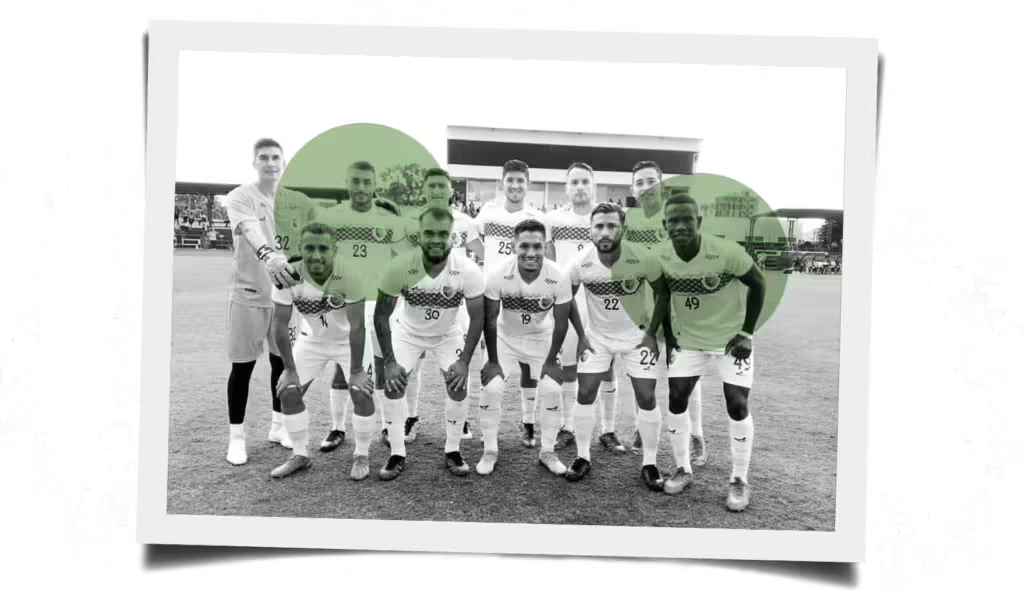
A team photo of the Leones del Torno, with Marset highlighted in the upper left and Carlos Villegas in the lower right. (Bolivia national police; iStock)
While Villegas struggled to get by on his $500-a-month salary, painting houses to earn extra cash, Amorim seemed to be living comfortably. Curious about his teammate’s apparent financial success despite playing in the lower rungs of professional soccer, Villegas decided to ask him directly.
After practice, Villegas approached Amorim, who was sitting on a bench near the field.
“How did you do it, man?”
Amorim responded with enthusiasm but was vague — and surprisingly fluent in Spanish for a Brazilian.
“It’s all about work. You need to work and work and work. You can’t ever give up,” Villegas recalled Amorim saying.
Villegas left the conversation feeling both inspired and confused.
“He never told me what he did to make the money,” Villegas later said in an interview. “And when I found out, it was a shock.”
Amorim was a pseudonym.
Marset had arrived in Santa Cruz — Bolivia’s financial capital — in late 2022. He renovated a mansion in the city center and installed security cameras at the entrance. He quickly integrated into the city’s elite circles, socializing with a former Miss Bolivia and her husband, sponsoring Carnival events, and organizing an exhibition soccer game with powerful business executives. Most notably, he purchased the Leones del Torno, a team that played in El Torno, a small town an hour outside the city.
Marset moved the team to Santa Cruz, where he built a state-of-the-art athletic training complex with a synthetic turf field at the end of a dirt road. He hired Gualberto Mojica, a former star player from the national team, to coach. And once again, he inserted himself into the starting lineup.
Despite being sought by law enforcement across the Western Hemisphere, Marset chose not to hide in a remote location. Instead, he settled in Bolivia’s largest city, which investigators say is known as a sanctuary for drug proceeds, confident that he could bribe authorities to avoid capture.
For over a year, Marset appeared to be correct; he expanded his real estate empire in Santa Cruz, seemingly unnoticed or ignored.
On the soccer field, Marset wore the number 23, like David Beckham at Real Madrid and Galaxy. The name on the back of his blue jersey was simply “Luis.” His skills had not improved.
“He wasn’t good,” said Lucas Casavieja, an Uruguayan player on the Leones.
“When I passed him the ball, a lot of the time he missed it,” said Villegas. “I got angry with him, like, ‘What are you doing?’”
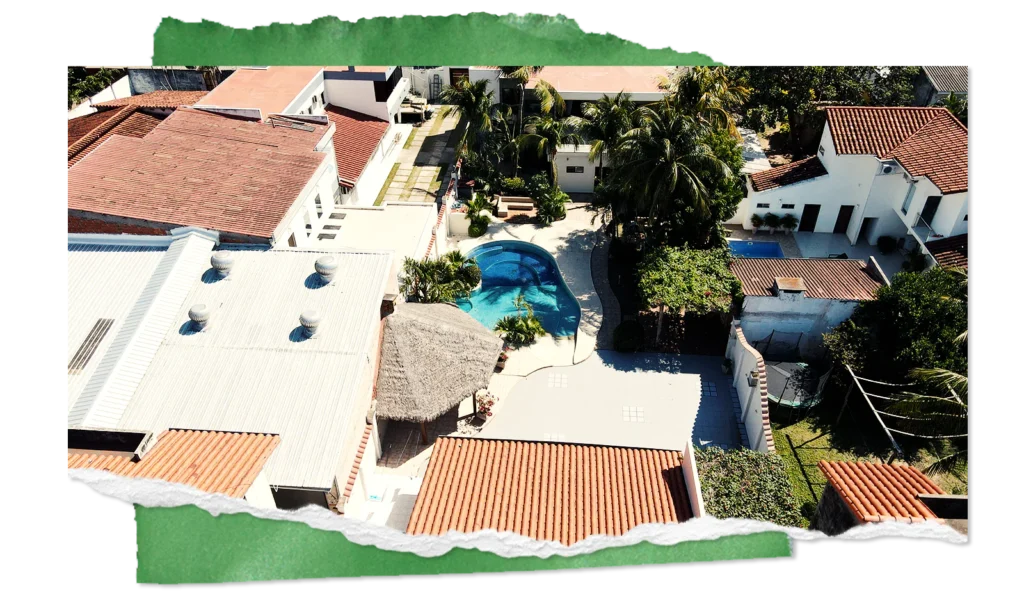
Marset’s mansion in Santa Cruz, Bolivia. (Miguel Surubi/AFP/Getty Images; iStock)
In May 2023, Bolivian authorities received a call from the Paraguayan anti-narcotics police. The Paraguayans had tracked Marset to Santa Cruz and needed the Bolivians to act.
The Bolivian police began surveilling Marset’s mansion, flying a drone overhead and posting officers around his upscale neighborhood. Marset was hiding with his wife and four children, all using false names. He had even managed to enroll one of his sons in the esteemed training program of Blooming, a Bolivian first-division soccer team.
Eventually, police planned an operation dubbed “Leon 23” after Marset’s team and jersey number, aiming to dismantle his entire network.
On the morning of July 29, dozens of officers stormed his house, only to find that Marset and his family were gone.
A manhunt ensued: 3,000 Bolivian police officers were deployed, and 158 checkpoints were set up across the country to prevent Marset’s escape.
The police arrested 39 people, including the Leones del Torno coach, two of Marset’s teammates, and the team’s grounds manager. They seized the team’s soccer field, 35 properties, nine aircraft, 77 cars, 81 weapons, and 1,315 head of livestock and poultry — totaling $27 million in assets.
Leones del Torno was suspended from Bolivia’s soccer federation. Former team officials could not be reached for comment.
Officials and neighbors in Santa Cruz later told The Post that Marset had fled days before the operation began. Neighbors reported seeing people loading trucks outside Marset’s home.
“The operation needed to be earlier,” said Jhonny Aguilera, Bolivia’s deputy interior minister and former national police chief. “We know that in hindsight.”
Marset’s teammates and coach were charged with “criminal association.” Their interrogation interviews yielded little: He was merely “another player,” they said. “An investor” or a “businessman.”
But Bolivian officials linked Marset’s involvement with the Leones to both his obsession with soccer and the practical need to launder drug proceeds.
“The objective was obviously to launder money,” Aguilera said of Marset’s investment in Leones del Torno.
A few weeks after Marset’s disappearance, Jessica Echeverría, a lawyer in Santa Cruz with a large social media following, received a message from an unknown number.
When she opened it, there was a video with Marset’s face in the center of the frame. Echevarría pressed play. She heard Marset explain how he had been tipped off about the Bolivia operation.
“Thanks to the help of the director of the anti-narcotics police, I managed to leave,” Marset said in the video. “He told me that the minister had already issued an arrest warrant against me.”
A few weeks later, he sent another video to local reporters. It was recorded from inside a car.
“I am too smart for you,” he said, taunting the Bolivian police. “It’s not to say that you are very stupid; it sounds a little better to say that I am just smarter.”
He threatened to expose the corrupt Bolivian officials who had allowed him to live freely and escape unharmed: “If I open my mouth, it gets complicated.”
The question of Marset’s whereabouts became a topic of intrigue among Latin American officials. Some hopeful fans also speculated about his return, hoping to appeal to his known interests.
“Between soccer and lovers, I am gripped by the hope that Don Marset will return,” sang Bolivian singer Belén Ortiz in her song “King of the South.”
Then, in November, Marset gave a television interview.
Uruguayan television anchor Patricia Martín said she took two helicopters to meet him — the first to a “half jungle” location and the second to a house in a clearing. Marset opened the door, she said; a soccer game was playing on the living room television. He wore a $1,100 Louis Vuitton green sweater and a gold watch and spoke vaguely about his ability to elude capture.
“I have people to do what I need to do,” he said.
Marset’s lawyer, Santiago Moratorio, who helped arrange the television appearance, wouldn’t say where it took place or offer any hints about his client’s current location.
On Wednesday, after months of radio silence, Marset’s wife, Gianina García Troche, was detained at the Madrid airport in a joint operation by Interpol and the Spanish government. She had flown to Spain from Dubai, according to Uruguayan and Paraguayan officials.
Moratorio claimed she wasn’t detained but had turned herself in. “She was tired of running from a crime she didn’t commit,” he said.
Marset remains at large, the subject of one of the most extensive manhunts in recent South American history.
Moratorio shared one detail from his visit with the journalist to Marset’s undisclosed location.
Before the television interview, Marset issued one more order: Let’s play some soccer. His visitors, guards, and associates formed two teams, and the game kicked off.

